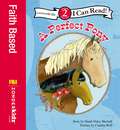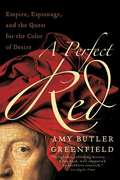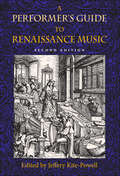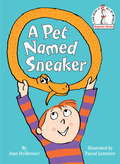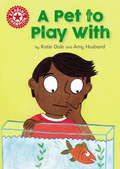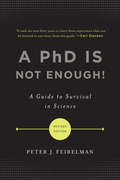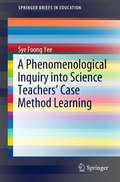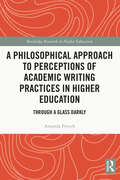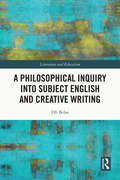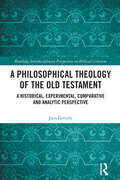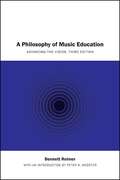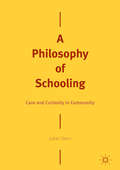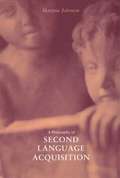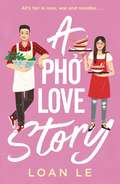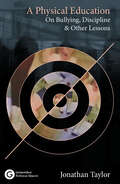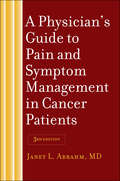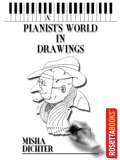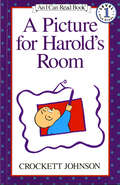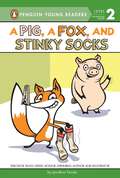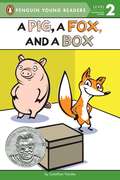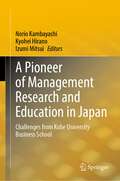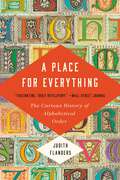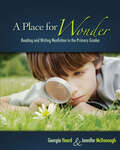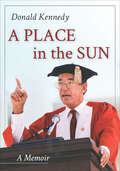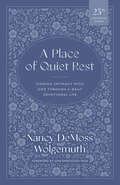- Table View
- List View
A Perfect Pony: Level 2 (I Can Read! #Level 2)
by Dandi Daley MackallA Lesson in Being Grateful. When Jen’s best friend Dave gets a pony for his birthday Jen is jealous and finds things wrong with her own horse! Will she learn what it means to be grateful for what she has?
A Perfect Red
by Amy Butler GreenfieldA Perfect Red recounts the colorful history of cochineal, a legendary red dye that was once one of the world's most precious commodities. Treasured by the ancient Mexicans, cochineal was sold in the great Aztec marketplaces, where it attracted the attention of the Spanish conquistadors in 1519. Shipped to Europe, the dye created a sensation, producing the brightest, strongest red the world had ever seen. Soon Spain's cochineal monopoly was worth a fortune. Desperate to find their own sources of the elusive dye, the English, French, Dutch, and other Europeans tried to crack the enigma of cochineal. Did it come from a worm, a berry, a seed? Could it be stolen from Mexico and transplanted to their own colonies? Pirates, explorers, alchemists, scientists, and spies -- all joined the chase for cochineal, a chase that lasted more than three centuries. A Perfect Red tells their stories -- true-life tales of mystery, empire, and adventure, in pursuit of the most desirable color on earth.
A Performer's Guide to Renaissance Music (Publications of the Early Music Institute)
by Jeffery Kite-PowellRevised and expanded since it first appeared in 1991, the guide features two new chapters on ornamentation and rehearsal techniques, as well as updated reference materials, internet resources, and other new material made available only in the last decade.The guide is comprised of focused chapters on performance practice issues such as vocal and choral music; various types of ensembles; profiles of specific instruments; instrumentation; performance practice issues; theory; dance; regional profiles of Renaissance music; and guidelines for directors. The format addresses the widest possible audience for early music, including amateur and professional performers, musicologists, theorists, and educators.
A Pet Named Sneaker
by Joan Heilbroner Pascal LemaitreFifty years after the publication of Robert the Rose Horse comes Joan Heilbroner's second Beginner Book--A Pet Named Sneaker, with illustrations by Pascal Lemaitre. A madcap tale reminiscent of The Cat in the Hat, Go, Dog. Go!, and Put Me in the Zoo, Sneaker is the story of a pet-store snake who longs for a real home. When he is finally adopted by Pete--a young boy charmed by Sneaker's uncanny ability to twist himself into different shapes--Sneaker not only proves himself a good pet, but proves to be a good student (sneaking into school with Pete and learning to read and write); a good citizen (saving a drowing toddler at a community pool); and a goodwill ambassador for the entire animal kingdom (inspiring the community to open the pool to all animals)! With delightfully understated, wickedly funny illustrations by Pascal Lemaitre, this is a fantastic, funny book that will sneakily get beginning readers reading on their own!
A Pet to Play With: Independent Reading Red 2 (Reading Champion #87)
by Katie DaleRaj can't wait to get a new pet, but there are so many to choose from! Which one will he pick? Reading Champion offers independent reading books for children to practise and reinforce their developing reading skills.Fantastic, original stories are accompanied by engaging artwork and a reading activity. Each book has been carefully graded so that it can be matched to a child's reading ability, encouraging reading for pleasure.Independent Reading Red 2 stories are perfect for children aged 4-5 who are reading at book band 2 (Red) in classroom reading lessons.
A PhD Is Not Enough!: A Guide to Survival in Science
by Peter J. FeibelmanDespite your graduate education, brainpower, and technical prowess, your career in scientific research is far from assured. Permanent positions are scarce, science survival is rarely part of formal graduate training, and a good mentor is hard to find. InA Ph. D. Is Not Enough!, physicist Peter J. Feibelman lays out a rational path to a fulfilling long-term research career. He offers sound advice on selecting a thesis or postdoctoral adviser; choosing among research jobs in academia, government laboratories, and industry; preparing for an employment interview; and defining a research program. The guidance offered inA Ph. D. Is Not Enough!will help you make your oral presentations more effective, your journal articles more compelling, and your grant proposals more successful. A classic guide for recent and soon-to-be graduates,A Ph. D. Is Not Enough!remains required reading for anyone on the threshold of a career in science. This new edition includes two new chapters and is revised and updated throughout to reflect how the revolution in electronic communication has transformed the field.
A Phenomenological Inquiry into Science Teachers’ Case Method Learning (SpringerBriefs in Education)
by Sye Foong YeeThis book illustrates a practical application of the Case Method as a teaching technique in teacher education, and examines how learning takes place in a teacher professional development activity. It also describes teachers’ lived experience of the activity based on Clark Moustakas' 1994 guidelines for organizing and presenting a phenomenological study.
A Philosophical Approach to Perceptions of Academic Writing Practices in Higher Education: Through a Glass Darkly (Routledge Research in Higher Education)
by Amanda FrenchThis book takes a philosophical approach to the question ‘what is academic writing?’ and specifically explores the question of how academic writing and writing development can be better understood and developed by lecturers in higher education. It examines how a number of interconnected and interdisciplinary political, linguistic, discursive, ontological and epistemological frameworks can be used to inform a ‘post-qualitative’ approach for research into higher education academic writing practices, employing a Bourdusian/ Deluzean inspired approach. Using lecturers’ own perceptions and experiences of academic writing, and treating them as part of a ‘professional academic writing in higher education habitus’, the book illustrates and analyses a number of ideas and concepts through a broadly post-qualitative paradigm. It also offers a number of innovative academic writing and writing development practices. Offering an in-depth discussion into how lecturers might better negotiate academic writing practices and use their own academic writing experiences to develop students’ writing, this book will be highly relevant to academics, scholars and post-graduate students working in higher education.
A Philosophical Inquiry into Subject English and Creative Writing (Literature and Education)
by Oli BelasWhile engaging with the current political-educational climate of England, this book offers a timely contribution to debates around questions of knowledge in relation to education and school-level English by drawing together theories of individual and disciplinary knowledge. The book provides a philosophical conception of knowledge – as fundamentally embodied at the level of the individual, and a matter of cultural form at the level of shared or "common" knowledge – and an analysis of the implications of this for schooled English. The research draws from various related fields including literary criticism, philosophy (of knowledge and of symbolic form), and phenomenology. The book rethinks general notions of knowledge and lays out the problems that exist within knowledge and language systems in education, especially secondary and university levels. This highly relevant and informative book offers an insightful resource for academics, researchers, and post-graduate students in the fields of education studies, educational policy and politics, philosophy of education, and literature studies.
A Philosophical Theology of the Old Testament: A historical, experimental, comparative and analytic perspective (Routledge Interdisciplinary Perspectives on Biblical Criticism)
by Jaco GerickeAre we able to identify and compare the philosophical perspectives and questions that must be postulated as having been somehow present in the language, ideas and worldviews of the Biblical authors? This book sets out an approach to something that has been generally considered impossible: a philosophical theology of the Old Testament. It demonstrates and addresses the neglect of a descriptive and comparative philosophical clarification of concepts in Old Testament theology, and in so doing treads new ground in Biblical studies and philosophical theology. Recognizing the obvious problems with, and objections to, any form of interdisciplinary research combining philosophical and Biblical theology, this study presents itself as introductory and experimental in nature. The methodology opted for is limited to a philosophical clarification of concepts already found in Old Testament theology, while the findings are presented via the popular thematic approach found in analytic philosophical theologies; with no attempted justification or critique of the textual contents under investigation. These approaches are combined by primarily looking at the nature of Yahweh in the Old Testament. This book offers a new vision of Biblical and philosophical theology that brings them closer together in order that we might understand both more broadly and deeply. As such, it will be vital reading for scholars of Theology, Biblical Studies and Philosophy.
A Philosophy of Music Education: Advancing the Vision, Third Edition
by Bennett ReimerBennett Reimer's A Philosophy of Music Education asserts that the nature and value of music education are determined primarily by the nature and value of music. Originally published in 1970 (with the third edition originally published in 2003), this text relates findings in the field of aesthetics to their implications for the practice of music education, thus emphasizing practical applications that students and future educators can employ in their teaching and learning. It addresses an increasingly diverse world in which music is viewed not as a singular practice but as a multitude of related practices. Reimer believes that music has characteristics that make it recognizably and distinctively a practice or an "art"; that these characteristics can be identified to a reasonable and useful degree (but no doubt never definitively); that music is of value to humans and their communities in a variety of ways related to these characteristics; and that the primary mission of music education is to make musical values widely and deeply available. Each chapter includes case studies ("Riffs") and questions for discussion/exploration ("Etudes") that enhance student learning. This reprint edition includes a new introduction by Peter R. Webster that sets Reimer's work in the context of the development of music education pedagogy and illuminates why this remains an important text for today's students. An excellent introductory text for undergraduate or more advanced music education students, A Philosophy of Music Education remains the best single introduction to this important and growing field.
A Philosophy of Schooling: Care and Curiosity in Community
by Julian SternThis book provides an optimistic account of the value and role of schooling. Schooling is a common but not universal approach to education and has need of its own distinctive justification, in contrast to other approaches such as home-based or work-based education. The book tackles and rejects the various large-scale ‘functional’ theories of schooling which continue to dominate current debates and policies, such as schooling supporting employment and the economy, or developing citizenship. Instead, it argues that schooling and schools should be viewed as places to learn community within and through community. The lived reality of relationships within schools, based on care and curiosity, is as strong as ever: and upon this foundation is built an original philosophy of schooling. This reflective book will appeal to students and scholars of philosophy of education and to all professionals concerned with schools.
A Philosophy of Second Language Acquisition
by Marysia JohnsonHow does a person learn a second language? In this provocative book, Marysia Johnson proposes a new model of second language acquisition (SLA)--a model that shifts the focus from language competence (the ability to pass a language exam) to language performance (using language competently in real-life contexts). Johnson argues that current SLA theory and research is heavily biased in the direction of the cognitive and experimental scientific tradition. She draws on Vygotsky's sociocultural theory and Bakhtin's literary theory to construct an alternative framework for second language theory, research, teaching, and testing. The origin of second language acquisition is not located exclusively in the learner's mind, the author says, but in dialogical interaction conducted in a variety of settings.
A Pho Love Story
by Loan LeAll's fair in love, war and noodles . . . If Bao Nguyen had to describe himself, he&’d say he was a rock. Steady and strong, but not particularly interesting. His grades are average, his social status unremarkable. He works at his parents&’ pho restaurant, and even there, he is his parents&’ fifth favorite employee. If Linh Mai had to describe herself, she&’d say she was a firecracker. Stable when unlit, but full of potential for joy and spark and fire. She loves art, and she dreams of making a career of it one day. The only problem? Her parents rely on her in ways they&’re not willing to admit, including expecting her to work practically full-time at their family&’s pho restaurant. For decades, the Mais and the Nguyens have been at odds, having owned competing, neighboring pho restaurants. Bao and Linh have resolved never to befriend each other, for fear of pushing too far and bringing on undue heartbreak. But when a chance encounter brings Linh and Bao closer, sparks fly . . .Can Linh and Bao&’s love survive in the midst of feuding families and complicated histories?This delicious debut is perfect for fans of When Dimple Met Rishi and To All the Boys I&’ve Love Before. Praise for A Pho Love Story: '(A) warm, full-bodied take on the star-crossed-lovers rom-com genre' Kirkus Reviews
A Physical Education: On Bullying, Discipline and Other Lessons (Goldsmiths Press / Unidentified Fictional Objects)
by Jonathan TaylorOn bullying, discipline, and power in school and beyond.What does it mean to be a bully? What does it feel like to be bullied—to be a victim, a pariah, a scapegoat? What are the techniques, patterns, and languages of bullying?Intermingling memoir with literary criticism, philosophy, and sociology, A Physical Education attempts to answer these questions. A highly original examination of the uses and abuses of power in the education system, it explores how bullying and discipline function, how they differ from each other, and how they all too often overlap. Taylor interweaves his own experiences with reflections on well-known literary representations of bullying and school discipline, alongside sociological, psychological, and philosophical theories of power. He discusses the transition from corporal punishment to psychological forms of discipline that took place in the UK in the 1980s, and he also investigates the divergences and convergences of physical, psychological, and linguistic bullying. Above all, A Physical Education sets out to understand bullying and discipline from an experiential perspective: what these things feel like from "within," rather than "above," for all those involved. There are horrors, tragedies, and cyclical traumas, certainly—but there are also absurdities, contradictions, grotesque comedies. Sometimes, beneath the Gradgrindian tyranny, there is trickery, laughter. And sometimes there are chinks in The Wall, through which other possible worlds might be glimpsed.
A Physician's Guide to Pain and Symptom Management in Cancer Patients
by Janet L. AbrahmThis highly regarded handbook provides clinicians with the information they need to treat their cancer patients effectively and compassionately.This comprehensive guide to managing pain and other symptoms for people with cancer has helped tens of thousands of patients and families. Designed for busy practicing clinicians, A Physician's Guide to Pain and Symptom Management in Cancer Patients provides primary care physicians, advanced practice nurses, internists, and oncologists with detailed information and advice for alleviating the stress and pain of patients and family members alike. Drawing on the work of experts who have developed revolutionary approaches to symptom management and palliative care, as well as on the lessons learned from patients and their families during her thirty years as a teacher and clinician, Dr. Janet L. Abrahm shows how physicians and other caregivers can help patients and families heal emotionally even as the disease progresses.The third edition includes updates to medications and clinical stories, and features two new chapters: "Working with Patients’ Families" and "Sexuality, Intimacy, and Cancer." New lessons from palliative care and hospice care can help patients, their professional caregivers, and their families support each other every step of the way.
A Pianist’s World in Drawings
by Misha DichterOne of the world's foremost concert pianists, Misha Dichter is also a celebrated artist--who has documented his life and musical career in witty and insightful black and white sketches for over 40 years. Many of the drawings have appeared to high acclaim in New York art galleries, and in A Pianist's World in Drawings, the artist's complete body of work is now available to fans, art aficionados, and collectors for the first time. This collection provides readers with an astute and perceptive visual account of the artist's life onstage, on the road, and behind the curtain. The accompanying captions and anecdotes deliver a fascinating and humorous perspective on the life of a high-profile professional musician. Dichter's drawings have been compared to those of New Yorker artists Saul Steinberg and George Grosz, both of whom bring a perspective of playful satire to their work. Screenwriter Marshall Brickman writes, "Not content with being one of our premiere concert artists, Misha Dichter has the temerity also to be a brilliant graphic artist. His drawings display all the grace, wit, and sureness of style we've come to expect form his performances. He has captured his world in a series of keenly and often hilariously observed drawings filled with wry insight. This is a collection for lovers of both music and graphic art. Move over, Saul Steinberg - there's a new guy on the block." "Misha Dichter shakes his diligent classical piano training to 'play' freely in his drawings. The joy we feel looking at them is rooted in the pleasure he takes making them. They are his record of trips taken, important moments, and the music world he knows so well. The drawings share the playfulness of Paul Klee and Saul Steinberg mixed with the social commentary of George Grosz." --James Goodman "I always enjoyed Misha's drawings. I found them artistic and so clever. Every time I look at them I say 'Aha! So true!' These cartoons are timeless." --Itzhak Perlman ABOUT THE AUTHOR Misha Dichter's family is from Poland--but he was born in Shanghai in 1945, after his Jewish parents fled the country at the onset of World War II. A few years later the family moved to Los Angeles--where he began piano lessons at the age of six. He later enrolled in The Juilliard School, studying under Rosina Lhevinne, and won the Silver Medal in the 1966 Tchaikovsky Competition--launching an acclaimed international career. Today, Mr. Dichter has performed with almost every major orchestra in the world. His critically-applauded classical recordings with MusicMasters, Koch Classics, Philips, and RCA display a passionate and nuanced interpretation of Brahms, Liszt, Gershwin, Beethoven, Stravinsky, Tchaikovsky, Schumann, Schubert, and other master composers. His frequent duo-piano performances with his wife, pianist Cipa Dichter, take him to festivals and concert halls throughout Europe and North America. Their first recording together, a three-CD album of Mozart's complete piano works for four hands released under the Musical Heritage Society label, was named 2005 Record of the Year by Music Web International. Mr. Dichter is also an accomplished writer--having contributed articles to renowned publications including The New York Times.
A Picture for Harold's Room (I Can Read Level 1)
by Crockett JohnsonFrom the treasured author of Harold and the Purple Crayon, Crockett Johnson, comes an I Can Read adventure for Harold and his magical purple crayon.Harold needs a picture for his bedroom wall, so he takes his purple crayon and begins to create a whole new world around him. But then he notices he has gotten very small—half the size of a daisy! Only a very clever artist could find his way home now.This Level 1 I Can Read imagination-sparking adventure is perfect for the beginning reader learning to sound out words and sentences. Whether shared at home or in a classroom, the short sentences, familiar words, and simple concepts of Level One books support success for children eager to start reading on their own.
A Pig, a Fox, and Stinky Socks (Penguin Young Readers, Level 2)
by Jonathan FenskeThe stars of Jonathan Fenske's 2016 Theodor Seuss Geisel Honor book, A Pig, a Fox, and a Box, are back!Pig and Fox are back—and so are their shenanigans! Told in a silly three-part story, A Pig, a Fox, and Stinky Socks begins with a prank, with Fox "gifting" Pig with a pair of stinky socks. But what happens when his plan goes awry and the shoe (or sock!) is on the other foot? With comical art and simple language, Pig and Fox's antics in this Level 2 reader will continue to crack kids up.
A Pig, a Fox, and a Box (Penguin Young Readers, Level 2)
by Jonathan FenskeIn the style of Mo Willems, Jonathan Fenske tells three humorous stories of two friends, Pig and Fox, and their shenanigans with a cardboard box (all of which involved Pig accidentally crushing Fox in the box). With comic art and simple language, this Level 2 reader is sure to have kids rolling with laughter.
A Pioneer of Management Research and Education in Japan: Challenges from Kobe University Business School
by Izumi Mitsui Norio Kambayashi Kyohei HiranoThe purpose of this book is to clarify the mission and history of Kobe University Business School (KUBS), not only for the development of management education but also for the familiarization of industry in Japan with the ideas of modern management. Kobe University was the first in Japan to establish a faculty of business administration and has continued to conduct research and education in the field to this day. Under the influence of Germany and the USA, the academic area of management in Japan has achieved unique development not witnessed in other countries. Since 1902, when its predecessor, Kobe Higher Commercial School, was established, KUBS has been a pioneer of research and education in management studies in Japan by overcoming many obstacles and difficulties.Even now in the age of globalization, the spirit of innovation and liberal academic style, from the time of its establishment, are inherent in KUBS, and the faculty members have made great efforts to be innovative in management studies. This book aims to explore the mission and history of KUBS and to elucidate the development process of Japanese-style management research and education by introducing the diverse areas of management studies and the profiles of researchers.
A Place for Everything: The Curious History of Alphabetical Order
by Judith FlandersFrom a New York Times-bestselling historian comes the story of how the alphabet ordered our world.A Place for Everything is the first-ever history of alphabetization, from the Library of Alexandria to Wikipedia. The story of alphabetical order has been shaped by some of history's most compelling characters, such as industrious and enthusiastic early adopter Samuel Pepys and dedicated alphabet champion Denis Diderot. But though even George Washington was a proponent, many others stuck to older forms of classification -- Yale listed its students by their family's social status until 1886. And yet, while the order of the alphabet now rules -- libraries, phone books, reference books, even the order of entry for the teams at the Olympic Games -- it has remained curiously invisible.With abundant inquisitiveness and wry humor, historian Judith Flanders traces the triumph of alphabetical order and offers a compendium of Western knowledge, from A to Z.
A Place for Wonder: Reading and Writing Nonfiction in the Primary Grades
by Georgia Heard Jennifer McDonoughIn A Place for Wonder, Georgia Heard and Jennifer McDonough discuss how to create a landscape of wonder, a primary classroom where curiosity, creativity, and exploration are encouraged. For it is these characteristics, the authors write, that develop intelligent, inquiring, life-long learners. The authors&’ research shows that many primary grade state standards encourage teaching for understanding, critical thinking, creativity, and question asking, and promote the development of children who have the attributes of inventiveness, curiosity, engagement, imagination, and creativity. With these goals in mind, Georgia and Jennifer provide teachers with numerous, practical ways—setting up wonder centers, gathering data though senses, teaching nonfiction craft—they can create a classroom environment where student&’s questions and observations are part of daily work. They also present a step-by-step guide to planning a nonfiction reading and writing unit of study—creating a nonfiction book, which includes creating a table of contents, writing focused chapters, using wow words, and developing point of view. A Place for Wonder will help teachers reclaim their classrooms as a place where true learning is the norm.
A Place in the Sun: A Memoir
by Donald KennedyMore than personal memoir, Donald Kennedy's story is not only a chronicle of watershed years in the history of Stanford University, but also a reflection on academia's perennial concerns. The story builds from his childhood and family in New England through mentors at Harvard to reflections on his early years at Stanford. What is the scope of a teacher's responsibilities? What is the proper balance between research and teaching? How far can a professor of literature stretch activism and free speech before losing tenure? How can the University look so rich and feel so poor? While biology department head, Kennedy founded Human Biology, Stanford's first interdisciplinary program. As president, issues of ethnic diversity, student activism, multicultural curricula, patent rights, divestment in South Africa, a student hostage crisis, and a major earthquake colored his pivotal years at Stanford. At the heart of Kennedy's journey has been the belief that one must give back to society as mentor, inspiring his students; as commissioner of the FDA, wrestling with issues of freedom and regulation; as editor of Science, confronting the clash of science and politics. Throughout the book, sidebar recollections from students, friends, and colleagues reflect on his caring encouragement and core humanity, his love of teaching, and a life profoundly committed to science and public service.
A Place of Quiet Rest: Finding Intimacy with God Through a Daily Devotional Life
by Nancy DeMoss WolgemuthThe God of the universe created us for a loving relationship with Him. We long for that sweet intimacy with God, but it often seems so out of reach. Yet even in the busyness of daily life, we hear those whispers calling us, drawing us to the feet of Jesus.Best-selling author Nancy DeMoss Wolgemuth demystifies the process of coming to know God intimately. For over 20 years A Place of Quiet Rest has spoken to readers, helping them to a deeper relationship with Christ. In A Place of Quiet Rest Nancy shares from her heart and life how a daily devotional time can forever change your life.This Nancy DeMoss Wolgemuth classic will encourage generations to come to find that place of quiet rest.
